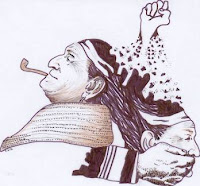The different indigenous groups in Latin America, from Mexico to Chile, are frequently supposed to be ethnically homogeneous. However there is growing evidence that most of them are in fact considerably heterogeneous. This phenomenon has been study by professor Garcia Canclini, a well known anthropologist currently living in Mexico, who has devoted many years to study what he has called “racial hybridization”.
This denomination is used in order to describe a social and demographic process of interaction among people from many different racial origins. This means that large groups in the population seem to belong to the same “original ethnic groups” even though just a small percentage of them comply with that condition. This is precisely what professor Villalobos argue with regard to the Mapuches in Chile. In the article in "El Mercurio" (30 August, 2009), he says that only 9,7% describe themselves as member of that ethnic group. Besides, according with the same source, 84% do not speak the original language (Mapudungun). However in Chile, it is well known that the Mapuches have been discriminated against, since the times of the colony ¿Should believe that such discrimination have affected only to the above mentioned 9,7 %?
I believe that discrimination is an structural social characteristic in our country. Often, we discriminate according to the socioeconomic level, physical features, surnames, sexual condition, language, etc. The list is long.
The Mapuche people have been historically discriminated against due to their language, physical features, surnames and other characteristics. The current conflict in the south reflects an historical struggle of the Mapuches to recover the land that the "wincas" snatched from them early in the Chilean history. However, the main reason for the current hunger strike has to do we the use of the Terrorism bill on the part of the Chilean government against the Mapuche leaders. Evidently this represent a new type discrimination because the legal consequences of this very peculiar statute isn't been used against the rest of the chilean population.
"All animals are equal...but some animals are more equal than other" (Orwell, 1945)
"All animals are equal...but some animals are more equal than other" (Orwell, 1945)

Oh! It´s so interesting!! You have a lot of references, it´s good.
ReplyDeleteSee you next tuesday!
Very successful quote of the Orwell's farm ;P, congratulations, it reflects that the problem involves not only the Mapuche, but also to all the marginalized in a modern society... as you say, the list is long. The painful is that this continues because, among other things, is a question of power, or rather, by the power... finally, a thing of language.
ReplyDeleteReally I liked you(r article)!